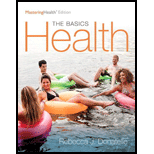
Health: The Basics, The Mastering Health Edition (12th Edition)
12th Edition
ISBN: 9780134183268
Author: Rebecca J. Donatelle
Publisher: PEARSON
expand_more
expand_more
format_list_bulleted
Question
Chapter 2, Problem 8PQ
Summary Introduction
To determine: The appropriate disorder
Introduction:
Psychologically healthy is a state of mind where a person’s mental health is comprehensive. He/she shows stability in emotions and adjusting behavior.
The disorder asked here is obsessive compulsive disorder. It is because of the characteristics listed like requirement to execute rituals, fright of contamination, symmetry, correctness, and facing an abnormal worry.
Expert Solution & Answer
Want to see the full answer?
Check out a sample textbook solution
Chapter 2 Solutions
Health: The Basics, The Mastering Health Edition (12th Edition)
Ch. 2 - Prob. 1WDYTCh. 2 - Prob. 2WDYTCh. 2 - Prob. 3WDYTCh. 2 - Prob. 4WDYTCh. 2 - Prob. 5WDYTCh. 2 - Prob. 6WDYTCh. 2 - Prob. 1PQCh. 2 - Prob. 2PQCh. 2 - Prob. 3PQCh. 2 - Prob. 4PQ
Ch. 2 - Prob. 5PQCh. 2 - Prob. 6PQCh. 2 - Prob. 7PQCh. 2 - Prob. 8PQCh. 2 - Prob. 9PQCh. 2 - Prob. 10PQCh. 2 - Prob. 1TAICh. 2 - Prob. 2TAICh. 2 - Prob. 3TAICh. 2 - Prob. 4TAICh. 2 - Prob. 5TAICh. 2 - Prob. 7TAICh. 2 - Prob. 8TAICh. 2 - Prob. 1AYCh. 2 - I am often moved by the beauty of the earth,...Ch. 2 - Prob. 3AYCh. 2 - Prob. 4AYCh. 2 - Prob. 5AYCh. 2 - Prob. 6AYCh. 2 - Prob. 7AYCh. 2 - Prob. 8AYCh. 2 - Prob. 9AYCh. 2 - Prob. 10AYCh. 2 - LO 1 | What Is Spirituality? 1. Spirituality could...Ch. 2 - LO 2 | The Benefits of Spiritual Health 2....Ch. 2 - LO 3 | Cultivating Your Spiritual Health/ 3. All...
Knowledge Booster
Similar questions
Recommended textbooks for you
 Medical Terminology for Health Professions, Spira...Health & NutritionISBN:9781305634350Author:Ann Ehrlich, Carol L. Schroeder, Laura Ehrlich, Katrina A. SchroederPublisher:Cengage Learning
Medical Terminology for Health Professions, Spira...Health & NutritionISBN:9781305634350Author:Ann Ehrlich, Carol L. Schroeder, Laura Ehrlich, Katrina A. SchroederPublisher:Cengage Learning Comprehensive Medical Assisting: Administrative a...NursingISBN:9781305964792Author:Wilburta Q. Lindh, Carol D. Tamparo, Barbara M. Dahl, Julie Morris, Cindy CorreaPublisher:Cengage Learning
Comprehensive Medical Assisting: Administrative a...NursingISBN:9781305964792Author:Wilburta Q. Lindh, Carol D. Tamparo, Barbara M. Dahl, Julie Morris, Cindy CorreaPublisher:Cengage Learning Human Heredity: Principles and Issues (MindTap Co...BiologyISBN:9781305251052Author:Michael CummingsPublisher:Cengage Learning
Human Heredity: Principles and Issues (MindTap Co...BiologyISBN:9781305251052Author:Michael CummingsPublisher:Cengage Learning


Medical Terminology for Health Professions, Spira...
Health & Nutrition
ISBN:9781305634350
Author:Ann Ehrlich, Carol L. Schroeder, Laura Ehrlich, Katrina A. Schroeder
Publisher:Cengage Learning



Comprehensive Medical Assisting: Administrative a...
Nursing
ISBN:9781305964792
Author:Wilburta Q. Lindh, Carol D. Tamparo, Barbara M. Dahl, Julie Morris, Cindy Correa
Publisher:Cengage Learning

Human Heredity: Principles and Issues (MindTap Co...
Biology
ISBN:9781305251052
Author:Michael Cummings
Publisher:Cengage Learning